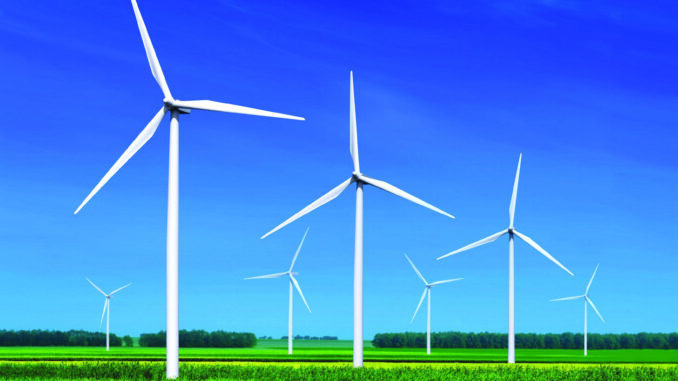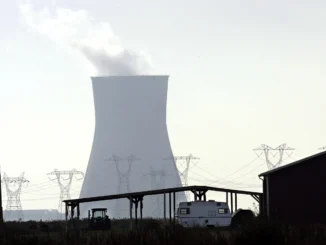
CLEAN ENERGY BILL ON HOLD — POLITICO’s Ry Rivard: A bill to create a nation-leading clean energy plan for New Jersey won’t be taken up by state lawmakers until after the election. The bill, NJ S2978 (22R), would put the state on the path to get 100 percent of its electricity from zero-carbon sources by 2035 — the most aggressive clean energy goal of any large state.
Sen. Bob Smith (D-Middlesex), chair of the Senate Environment and Energy Committee, had previously hoped to have the bill out of committee before the fall. Now the bill is unlikely to get a hearing until the end of the year. “It’s definitely a post-election thing, hopefully,” Smith told POLITICO.
Surely, Republicans could hammer Democrats in an election year about the upfront costs of clean energy standards that the bill would impose on the state and its ratepayers. In the long term, its supporters argue it would save money, curb climate change and move the state away from reliance on unstable commodities, like natural gas. Gov. Phil Murphy, a Democrat, has already set a similar 100 percent clean energy goal, but a law from a bill like Smith’s is important in a state where the governor’s office tends to go back and forth between Republicans and Democrats. Only the smaller, far less populated Rhode Island and Washington, D.C., have more aggressive goals than New Jersey.
Instead of blaming electoral politics for the delay, Smith cited two obstacles from traditional Democratic allies, labor unions and — surprisingly enough — environmentalists. Organized labor is worried that the bill will prompt the state to buy inexpensive power from outside of the state, curbing the demand for local workers. Some environmentalists — including the New Jersey League of Conservation Voters — have come out against an early version of the bill because it counted all power sources that currently qualify for renewable energy credits and ratepayer dollars, including incinerators that burn trash to generate energy. That’s a no-go for some who argue the incinerators create tons of air pollution in the low-income communities in which they are located. The league, one of the state’s leading environmental groups, said it’s going to oppose the bill unless incinerator support is moved.
NYPA NOMINATION FIGHT: Backers of the measure that expanded NYPA’s ability to build new renewables are organizing to oppose Gov. Kathy Hochul’s expected nomination of Justin Driscoll, the current head of the organization, in the final week of session. Sen. Kevin Parker (D-Brooklyn) said Hochul was planning to officially nominate Driscoll. The role is subject to confirmation by the Senate, and some senators had already publicly stated their opposition to Driscoll, who donated to Republican candidates before joining NYPA and opposed a more expansive measure to expand the authority’s responsibilities and role in building new projects before federal tax credits were available for NYPA-owned new renewables projects.
A hearing on Driscoll’s nomination has not yet been scheduled. Hochul has likely learned her lesson on sending over nominees without sufficient support for confirmation. But Driscoll will face opposition among Democrats at least from Sen. Jabari Brisport (D-Brooklyn), who released a statement criticizing Driscoll’s record last week. “Like her nomination of Hector LaSalle, Governor Hochul wants a right-wing corporate accomplice to lead a vital institution with a vision antithetical to New Yorkers’ values,” he said. “Justin Driscoll is not an acceptable option to become the official head of NYPA.” The Senate’s two other Democratic Socialists last year said they’d oppose Driscoll taking on the role.
“Following a national search last year, Governor Hochul recommended Justin Driscoll for President and CEO of the New York Power Authority because he has the expertise to lead the nation’s largest state-owned utility, helping New York to achieve its ambitious climate goals using both NYPA’s existing authorities and its expanded mandate to build renewable energy secured in the” budget, said Hochul spokesperson Katy Zielinski in a statement last month. Driscoll has served in the role for about a year and a half. “I think I’ve demonstrated that I was worthy of the confidence that the governor showed in me and I’m excited to continue to serve here,” he said in a May interview. — Marie J. French
RENEWABLE DEVELOPERS SEEK BIGGER PAYOUT — POLITICO’s Marie J. French: Developers of new renewable energy projects in New York are poised to request bigger payouts for already-contracted projects the state is counting on to hit its climate targets. A formal petition to the state’s utility regulator, the Public Service Commission, is expected in the coming days from the Alliance for Clean Energy New York, which represents the industry, two officials familiar with the plan told POLITICO and were granted anonymity to discuss the case. The request is expected to cite recent inflation and other challenges for projects that have already received contracts from NYSERDA and ask for an “inflation adjustment” — increased payments — for onshore renewables. The ask from the developers throws into question the state’s pipeline of renewable energy projects, which state officials have pointed to as evidence that New York is on track to reach 70 percent renewable energy by 2030.
WHAT YOU MAY HAVE MISSED
CAP-AND-TRADE INPUT SOUGHT: New York policymakers are seeking input on regulations to implement a cap-and-trade style program (dubbed “cap and invest”) to reduce emissions in the state and provide funding for clean energy programs. While the Department of Environmental Conservation had already started to seek feedback and typically does so in private forums before a formal rulemaking, the landmark cap-and-trade policy, which would be the first economy-wide program on the East Coast, is getting a higher profile treatment. Gov. Kathy Hochul’s administration has raised concerns about the affordability of the plan, offering an ill-timed pitch to rewrite the state’s climate law to change the parameters.
The first of seven webinars was a fairly dry outline of the dozens of questions DEC is seeking input on. Some of the key issues include:
The 2030 and 2050 targets are set, but the slope — the rate at which the emissions cap declines to reach those limits already established by DEC based on the climate law — is a key decision point.
Defining obligated sources and thresholds for both compliance (entities required to purchase allowances to pollute) and reporting (those that have to provide information) are also key questions. Non-obligated sources will still be accounted for in the program to ensure achievement of the state’s targets. Jon Binder, DEC’s deputy commissioner for Air Resources, Climate Change and Energy, said designing the program to potentially have linkage to markets like California in the future is a priority. That could prove tricky given the unique accounting requirements in New York’s climate law that differ from those used elsewhere and result in different emissions intensities for fuels.
“We’re not intending to have offsets be part of this program,” Binder said. That’s an important commitment and has been a key concern for environmental advocates, who worry offsets would weaken the state’s climate goals.
Questions are also available on the state’s “cap and invest” website and DEC is asking for feedback by July 1 to inform the next round of stakeholder input. The next webinar focuses on issues around natural gas and is set for June 6. — Marie J. French
BOOKER URGES LNG TRAIN SAFETY: Sen. Cory Booker (D-N.J.) is urging federal Transportation Secretary Pete Buttigieg to “prioritize public safety” as the Biden administration weighs a potential ban on trains carrying liquefied natural gas. A Trump era rule allows trains to carry LNG but, so far, there are not shipments happening. In a letter, Booker praised the Biden administration’s “swift action to pause implementation” of the Trump rule, but said allowing LNG by rail has “significant impacts on public safety.” The issue has taken on new resonance following a train disaster in Ohio this year, though Booker also referenced a 2012 derailment of a train carrying vinyl chloride in New Jersey. Neither involved LNG, but they highlighted gaps in the rail safety system.
“These derailments are an unfortunate reminder of the dangers of rail transport of hazardous materials, particularly highly flammable and potentially explosive cargo, and the urgent need to strengthen safety protocols and emergency response policies,” Booker wrote, in the letter which was obtained by POLITICO.
Democratic attorneys general and environmental groups have sued to block the Trump era rule but the case was on hold while they waited to see what Biden would do. Now, after repeated delays, they want to reactivate that lawsuit given how long Biden’s team has taken to get to the issue. — Ry Rivard
BLOWING HIGHER: New York lawmakers want to increase the state’s statutory offshore wind goals to outpace New Jersey, where Gov. Phil Murphy increased the goal last year. “We want to be back on top,” said Julie Tighe, president of the New York League of Conservation Voters, at a press conference in Albany on Wednesday.
The proposal sponsored by Sen. Brian Kavanagh and Assemblymember Didi Barrett would boost the 9 gigawatt goal enshrined in the state’s 2019 climate law to 9.9 GWs. It would also set new out-year targets of 15.8 GW by 2040, 18 GW by 2045 and 20 GW by 2050. New Jersey has a non-statutory executive target of 11 GW by 2040. California’s goal is 25 GW by 2045. — Marie J. French
SCHOOL OF CONSERVATION DEAL DONE, DAM LOOMS — POLITICO’s Ry Rivard: The state is turning over management of the New Jersey School of Conservation to a nonprofit, ending part of a long-running saga about the fate of an education center beloved by many of the state’s leading environmentalists.
WILL NEW JERSEY JOIN THE OTHER ACC: Progressive activists are worried New Jersey will miss a key deadline to speed along the exit of gas-powered cars. In February, Gov. Phil Murphy promised the state would look to follow California‘s ban on the sale of new gasoline-powered cars by 2035.
New York, Massachusetts and several other states already adopted the rule, known as Advanced Clean Cars II, last year. That means the gradual phase out of gas cars would begin there in the 2026 model year by requiring that 35 percent of new vehicles have zero emissions. If New Jersey adopted the rule this year, it wouldn’t take effect until the 2027 model year.
A spokesperson for the New Jersey Department of Environmental Protection, Larry Hajna, said the department’s “goal is to publish the proposal in the register this summer and adopt by the end of the year.” — Ry Rivard



